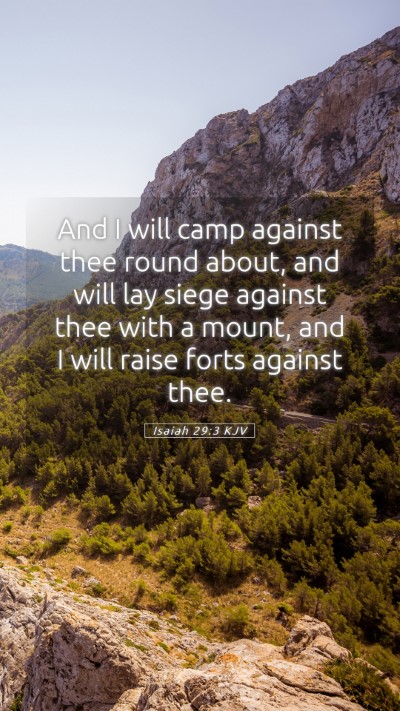Understanding Isaiah 29:3
In Isaiah 29:3, the Lord speaks to Jerusalem, portraying God's intention to bring judgment amidst the people who have turned away from Him. This verse invites us into a deeper understanding of divine sovereignty and the prophetic warnings given to wayward nations. Together, we will explore the Bible verse meanings, Bible verse interpretations, and explanations based on respected public domain commentaries.
Verse Text
“And I will camp against you all around, and will besiege you with towers and I will raise siege works against you.” - Isaiah 29:3 (ESV)
Context of Isaiah 29:3
This verse takes place during a tumultuous period in Israel's history, characterized by rebellion and disobedience toward God. The context of chapter 29 portrays the consequences of such defiance through vivid imagery of siege and destruction.
Analysis of Key Terms
- Camp Against You: Indicates an encircling threat; a divine siege representing judgment.
- Besiege: Suggests a method of oppression; God’s fierce protection turned into punishment.
- Towers and Siege Works: These metaphors imply the fortifications of God’s judgment; nothing can withstand His will.
Commentary Insights
According to Matthew Henry, this verse signifies God’s impending judgment, emphasizing the folly of relying on human strength instead of the Almighty. He notes that God's judgment serves both as a warning and a means to bring His people back to repentance.
Albert Barnes reflects on the military imagery employed in this verse, interpreting it as a clear display of God's capability to confront and dismantle human pride. His commentary emphasizes the assurance that God remains in control, even when circumstances seem dire.
Adam Clarke highlights the psychological effect of such a siege on the people: the fear and despair that arise when one realizes the total dependence on God's mercy. Clarke’s insights reveal that the figurative language is meant to provoke reflection and guide individuals toward seeking reconciliation with God.
Broader Theological Implications
This passage raises essential questions about divine judgment and mercy. It emphasizes God’s role as both protector and punisher, particularly as the Israelites strayed from faithfulness. The implications of Biblical exegesis here serve to inform our understanding of God's relationship with humanity throughout history.
Practical Applications
Isaiah 29:3 calls us to reflect on our personal lives and draws parallels to how we might stray away from God. This verse is particularly significant in Bible study groups as it offers a foundational discussion point for understanding God's discipline:
- Recognize areas of disobedience in life.
- Seek spiritual awakening and repentance.
- Understand the importance of returning to God's protection through faith.
Related Scriptures
For further study, consider these cross-references that accentuate themes in Isaiah 29:3:
- Isaiah 1:18-20 - God's call to repentance and promise of forgiveness.
- Jeremiah 6:14 - A critique of false security in the face of impending judgment.
- Ezekiel 18:30 - A call to repentance and turning away from all offenses.
Conclusion
Isaiah 29:3 serves not just as a historical warning but as a timeless message about the importance of remaining faithful to God. Through Bible study insights and Scripture analysis, we can glean profound lessons on the consequences of straying from divine guidance. Engaging with this verse may significantly enhance our understanding of Scripture and encourage honest reflection on our lives in relation to God's command.


